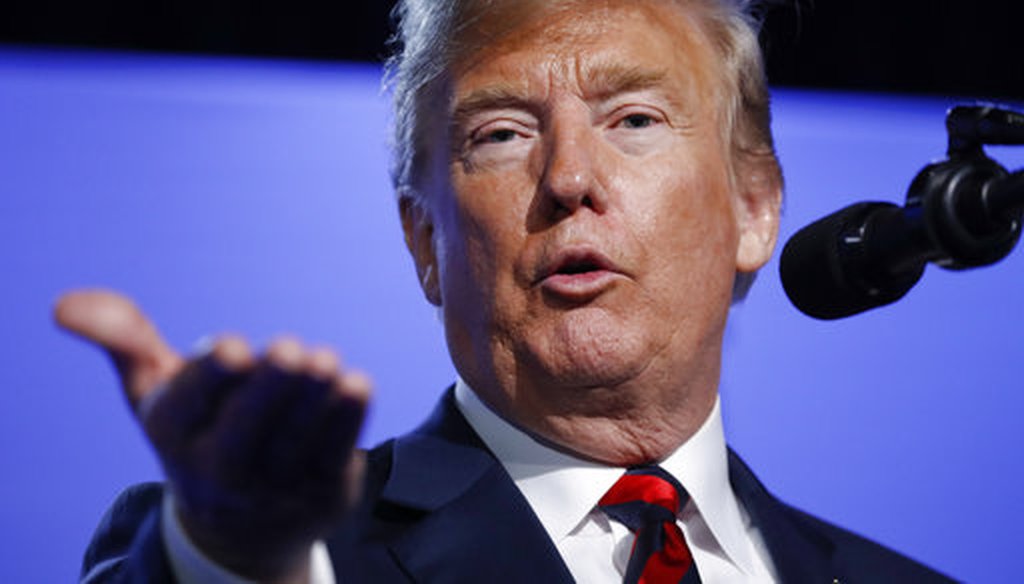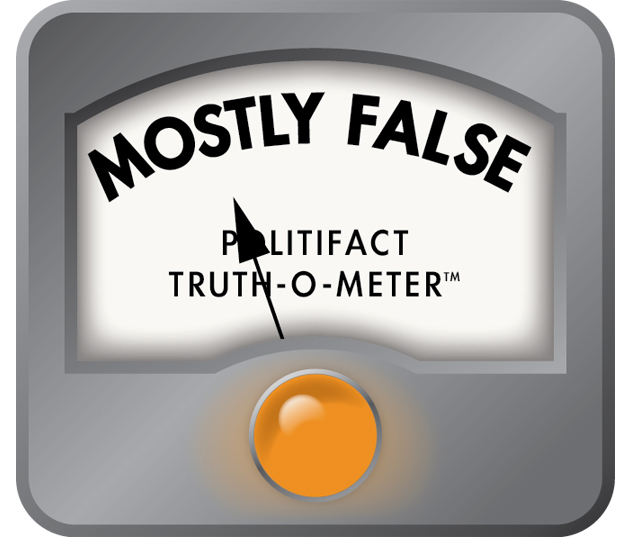Stand up for the facts!
Our only agenda is to publish the truth so you can be an informed participant in democracy.
We need your help.
I would like to contribute

President Donald Trump speaks during a news conference on July 12, 2018, before departing the NATO Summit in Brussels, Belgium (AP/Pablo Martinez Monsivais)
President Donald Trump fielded questions about the United States’ strained relationship with NATO allies at the conclusion of the NATO summit in Brussels.
We fact-checked several of the president’s more memorable claims from the press conference below.
"Prior to last year where I attended my first meeting, it was going down, the amount of money being spent by countries was going down and down very substantially, and now it's going up very substantially."
This is inaccurate. NATO members report their total defense spending to the organization and since 2014, total spending by the European members and Canada has gone up. In real dollars, European spending rose from about $254 billion in 2014 to $275 billion in 2017. That’s over an 8 percent rise in three years.
Trump met with NATO leaders for the first time in 2017. Their spending had been headed up before that gathering and continued afterward.
Sign up for PolitiFact texts
Former Secretary of State John Kerry said their defense spending had been rising. We rated that True.
"Since last year they've raised an additional $33 billion that's been put up by the various countries, not including the United States."
The president did not cite a source for this claim, and it was not immediately clear where he got the figure or what exactly it referred to. It seems likely, however, that he was talking about additional defense spending on the part of NATO members over the last year.
Using estimated spending totals from a July 10, 2018, NATO report detailing the defense expenditures for member countries, we calculated that other NATO countries added a little more than $33 billion toward defense expenditures.
But when we accounted for inflation and used as the basis of our calculation constant 2010 prices and exchange rates provided by the same report, that number we came up with was actually closer to $11 billion.
"I think NATO's a very important -- probably the greatest ever done. But the United States was paying for anywhere from 70 to 90 percent of it, depending on the way you calculate."
Trump’s claim rates Mostly False.
The United States does pay for 22 percent of NATO's common fund, a small budget of less than $5 billion. But beyond that relatively small amount, the cost of NATO is undefined.
NATO does track the defense budgets of its members, and based on those totals, U.S. defense spending amounts to approximately 70 percent. But this is because the United States is a global military power, and the European members are not.
"Our farmers have been shut out of the European Union."
Trump has made similar statements about the European Union’s treatment of American farmers before, but his complaint is not literally true.
The EU does impose a slightly higher average tariff on agricultural goods than the United States, but according to the World Trade Organization, approximately 30 percent of agricultural products are shipped into both the United States and the EU tariff-free.
As a result, the 28 countries of the EU made up the fifth-largest export market for U.S. agricultural goods in 2017, according to the Department of Agriculture. The United States exported $11.5 billion worth of agricultural goods to the EU.
It is worth mentioning that the United States imported more agricultural goods than it exported.
"The 2 percent was a range, a goal, it wasn't something they were committed to. Now it's a commitment."
It is true that a 2006 pledge to commit 2 percent of each country’s GDP to defense spending was not a commitment in the binding or legal sense. But it is yet unclear if that changed this week.
The commitment started at the 2006 NATO summit in Riga, Latvia. NATO spokesman James Appathurai told reporters during a 2005 press briefing that "this is not a hard commitment that they will do it."
A timetable was added to the commitment in 2014, when NATO members collectively agreed to move toward meeting the 2 percent guideline by 2024. According to NATO’s most recent report detailing defense expenditures, only five countries currently satisfy that threshold: the United States, Greece, the United Kingdom, Estonia and Latvia.
Several world leaders — including German Chancellor Angela Merkel and French President Emmanuel Macron — indicated that member countries recommitted to the 2 percent guideline.
"So we have a commitment to spend 2 percent," NATO Secretary General Jens Stoltenberg said after being asked about Trump’s claim that members had agreed to up the guideline to 4 percent. "The important thing now is that we need to invest more — we need to get more money. And the good thing is that, very much because of that very clear message from President Trump on this meeting, I think that allies understand this need to do that."
Wisconsin was "the one state that Ronald Reagan didn't win when he ran the board his second time. He didn't win Wisconsin, and we won Wisconsin."
This is incorrect. Reagan won Wisconsin in 1980 and again in 1984, according to the historical election data from the National Archives and Records Administration.
Trump has repeated this false claim multiple times, including at rallies in North Dakota and Wisconsin.
The United States "just had the largest military budget ever, $700 billion, approved."
Trump is correct that the defense budget hit $700 billion, but he is wrong to say that total amounts to the "largest military budget ever."
On Feb. 9, 2018, Trump signed into law the Bipartisan Budget Act of 2018, a two-year agreement that boosted the budget authority for national defense to $700 billion for fiscal year 2018 and $716 billion for fiscal year 2019.
According to the White House’s Office of Management and Budget (See Table 5.1), the budget authorities for national defense exceeded $700 billion in nominal dollars — dollars not adjusted for inflation — in both 2010 and 2011.
When adjusted for inflation, the budget authorities for national defense totaled greater than $700 billion in 2007, 2008, 2009, 2010, 2011 and 2012, according to calculations cited by FactCheck.org.
On the Iraq War: "I was not in favor of that war. I was very much against that war."
Trump repeated similar versions of this claim often during the 2016 presidential election.
The earliest evidence of the president’s outright opposition to the war came in a 2004 interview published in Esquire. "Look at the war in Iraq and the mess that we're in," Trump said. "I would never have handled it that way."
But before that interview, Trump offered several different takes. When asked if he supported the looming invasion during a 2002 interview with Howard Stern, Trump said, "Yeah, I guess so."
The following year, Trump gave Fox New’s Neil Cavuto a more mixed message in response to a question about whether President George W. Bush should focus more on Iraq or the economy. Trump said Bush should prioritize the economy, but he did not object to the war effort.
Our Sources
C-Span, "President Trump News Conference," July 12, 2018
PolitiFact, "Donald Trump misleads on US defense spending, NATO budget," July 12, 2018
United States Department of Agriculture Foreign Agricultural Service, "Top Markets for U.S. Agricultural Exports in 2017," March 20, 2018
The New York Times, "Trump Falsely Claims It’s ‘Impossible’ for American Farmers to Do Business in Europe," July 10, 2018
NATO, "Defence Expenditure of NATO Countries (2011-2018)," July 10, 2018
U.S. Department of Defense, "Fiscal Year 2019 Budget Request," February 2018
PolitiFact, "Donald Trump off-base in describing GDP growth on his watch," July 12, 2018
NATO, "Press Briefing," June 8, 2005
NATO, "Wales Summit Declaration," September 5, 2014
The Washington Post, "At NATO, Trump claims allies make new defense spending commitments after he upends summit," July 12, 2018
Reuters, "Stoltenberg confirms NATO commitment to spending 2 percent of GDP on defense: CNN," July 12, 2018
National Archives and Records Administration, U.S. Electoral College, "Electoral Votes for President and Vice President 1977-1993," accessed July 12, 2018
PolitiFact, "President Trump makes some interesting claims about Wisconsin's Republican voting history," June 29, 2018
Congress.gov, Bipartisan Budget Act of 2018, February 9, 2018
The White House, Office of Budget and Management, Historical Tables, accessed July 12, 2018
FactCheck.org, "Trump’s Defense Spending Exaggerations," July 11, 2018
PolitiFact, "Trump repeats wrong claim that he opposed Iraq War," September 7, 2016



 PolitiFact Rating:
PolitiFact Rating: 
 PolitiFact Rating:
PolitiFact Rating:  PolitiFact Rating:
PolitiFact Rating:  PolitiFact Rating:
PolitiFact Rating:  PolitiFact Rating:
PolitiFact Rating: 










































